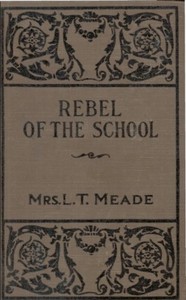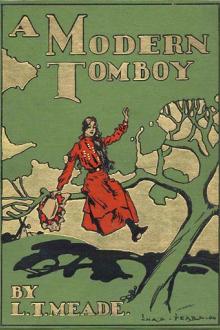The Rebel of the School, L. T. Meade [best historical biographies .txt] 📗

- Author: L. T. Meade
Book online «The Rebel of the School, L. T. Meade [best historical biographies .txt] 📗». Author L. T. Meade
"How can you stand it?" said Kathleen. "Doesn't it break your heart to see him?"
"Oh no," said Ruth. "You see, I am accustomed to him. He talks like that. I am sorry he is so bothered about the accounts, but perhaps that phase will pass."
"He is so pleased about you and the scholarship."
"Yes," said Ruth. She turned pale. "Whatever happens," she added, "he must never know."
"What do you mean about whatever happens?"
"He must never know if I do not get it. Good-bye now, Kathleen. I am glad you have seen grandfather and granny. I must go back to granny now. She is very tired; she gets so little rest at night."
Kathleen went slowly home. The meal was over at the Tennants', but somehow her couple of potatoes had satisfied her. She felt much more sober than she had done in the morning; she was inclined to think, to consider her ways. She felt an uncomfortable sensation of being haunted by the faces of Ruth and the old man.
"But of course Ruth will get her scholarship," she said to herself. "Of course—of course her grandfather is right. Her brain is of the right order, and her mind is attuned to learning. How nicely he spoke, and how beautiful he looked—how like my dear old grandfather who has been with God for so many years now."
There came a loud rat-tat at the front-door. David went out and brought in a telegram. It was addressed to Kathleen. She opened it in some surprise, and read the contents slowly. There was amazement on her face; a feeling of consternation stole into her heart. The telegram, not a long one, was from her father:
"Have just seen Aunt Katie O'Flynn. Do not approve of your society. Squash the whole thing at once, or expect my serious displeasure.—O'Hara."
"Is there an answer?" asked David.
"No," said Kathleen. "I mean yes. Yes, I suppose so. Can I have a form? Mrs. Tennant, can I have a telegraph form?"
Mrs. Tennant began to hunt about for one. Telegrams were by no means common things at the Tennants' house. David suggested that the messenger boy might have one. This turned out to be the case. Kathleen began to write, but she suddenly changed her mind.
"No, no; there is no answer," she said. "I can write by post."
She crushed the telegram up and thrust it into her pocket. After this she went out for a little; she was too restless to stay still. The fascination of the coming sport grew greater as obstacles appeared in the way of its realization. Whatever her father might say, she could not desert the girls who belonged to her society now.
"What can have ailed Aunt Katie to betray me in such a fashion?" she thought.
She came home in time for tea; but, to her amazement she found another telegram waiting for her. This was from Dublin, from Aunt Katie herself:
"Have told your father. He received letter from school-mistress this morning. Very angry about Wild Irish Girls. You must give the whole thing up or you will incur his serious displeasure. Don't be a goose; nip the thing in the bud immediately.—Aunt Katie."
"But indeed I won't," thought Kathleen. "Whatever happens, we will have our fun to-night. Whatever happens, neither father nor Aunt Katie, nor Ruth Craven can keep me back."
CHAPTER XXV. KATHLEEN HAS A GOOD TIME IN LONDON.So the head-mistress had written; she had dared to write to Kathleen's father. What she said to him was a matter of no moment; she had written, and to complain of her!
"She thinks, I suppose," said Kathleen, "that she'll subdue me by these means. She wants to bring, not the long arm of the law, but father's arm right across the sea to stop me. No, no, daddy, your Kathleen will be your Kathleen to the end—always loving, always daring, always true, but always rebellious; the best and the worst. I am going to-night, and I am going all the more surely because you wired to me not to go, and because they are daring to bully dear little Ruth Craven. And after I have had my fling I will come back in good time. No fear; nothing will go wrong. Your Kathleen wouldn't hurt a fly, much less your heart. But I mean to have my fun to-night."
Kathleen quite sobered down as these thoughts came to her. It was now getting dusk. The girls were to meet at the station at half-past five. They were to go in quite quietly by twos and twos; each couple of girls was to go to the booking-office and take their tickets, and walk away just as though nothing special had happened. They were on no account to collect in a mass. They were not even to take any notice of each other until they were off. Once the train was in motion all would be safe; they might meet then and talk and be merry to their hearts' content. Oh, it was a good, good time they were about to have!
This arrangement about meeting one another had been suggested by Kate Rourke, who knew a good deal about theatres, and who also knew how dangerous it would be for so many girls to be seen at the station together; but dressed quietly, and just dropping in by couples, nobody would remark them.
"And then we must go straight to the theatre," she said, "and stand outside the pit, and take our chance; but we will have time enough for that if we leave Merrifield by the quarter-to-six train."
Kathleen noticed that evening that Alice watched her as she moved about the room; that Alice occasionally lifted her eyes and glanced at her when she sat down to read; and when she approached the tea-table and helped herself to tea and bread-and-butter and jam, Alice also kept up that gentle sort of espionage. It annoyed Kathleen; she found herself watching for it. She found herself getting red and annoyed when the calm, steadfast gaze of Alice's brown eyes was fixed on her face. Finally she said:
"What are you doing? Why do you stare at me?"
"Sorry," replied Alice. She bent over her book, and did not glance again at Kathleen.
By-and-by Kathleen went upstairs. She went to their mutual room, and turned the key in the lock.
"I must get out of the window," she said to herself. "I can easily do it; it is but to swing on to that thick cord of ivy and I shall reach the ground without the slightest trouble. The back-gate that leads into the garden is never locked, and the window I mean to emerge from looks into the garden. I shall go off without anybody's noticing me."
Kathleen had to take a great deal of money with her. If there were forty girls, their tickets would cost a good deal. It is true they were to buy their own in the first instance, but Kathleen was to return them the money in the train. Then the omnibuses they were to go on, the seats at the theatre, their supper of some sort must be paid for by the head of the society.
"I promised to frank them, and I must frank them," thought the girl.
She slipped some sovereigns into her purse, tucked it for safety into the bosom of her dress, and then put on her hat and jacket. Some instinct told the wild, ignorant child to dress quietly. She put on her plainest hat and a little reefer coat which looked neat and substantial. She was just drawing a pair of gloves on her hands when Alice was heard turning the handle of the door.
"Let me in at once, Kathleen," she cried.
Kathleen did not reply at all for a moment; then she said in a sleepy, smothered sort of voice which seemed to proceed from the bed:
"I have a splitting headache; don't disturb me."
"Very sorry," answered Alice, "but I really must come in."
Kathleen made no answer. After a long pause, during which Alice once or twice felt the handle of the door again, the sound of her retreating footsteps was heard.
"Now is my time," thought Kathleen.
To tell the truth, Alice was not at all taken in by Kathleen's headache.
"She is very clever," thought that young lady, "but she has tried that dodge on so often before that I am not going to be deceived by it now."
Accordingly she went into her mother's room and stood by the window. Now the window of Mrs. Tennant's bedroom looked also into the garden, and was really parallel with the window by which Kathleen meant to escape. There was an interval of silence, and then Alice had her reward! for the window of their mutual bedroom was flung wide open, and Kathleen, neatly dressed, appeared on the window-sill. She looked around her for a minute. Alice caught a glimpse of her bright face by the light of the moon, which was already getting up in the sky. The next minute Kathleen caught firm hold of the arm of old ivy and let herself down deftly and quickly to the ground. The action was done so neatly, and in fact so beautifully, that Alice in spite of herself felt inclined to cry "Bravo!" She knew that if she were to trust herself to that ivy she would probably fall to the bottom and get, if not really killed, at least half so. But Kathleen stood serenely on the ground, and glanced up at the window from which she had let herself down. Just at that moment Alice rushed into their bedroom. Kathleen had shut the window behind her before she trusted herself to the ivy; she had also unlocked the door. In a moment Alice had put on her hat and jacket, had rushed downstairs, opened the hall door, and was following Kathleen across the common. Now, quite the nearest way to the railway station was across the common. Kathleen walked fast.
"Kathleen, Kathleen!" cried Alice.
Kathleen looked behind her. She saw Alice, and took to her heels.
"No, no, Kathleen; I will follow you until I drop. You must let me come up with you."
But Kathleen made no answer. If she could do anything well, she could run in a race. Her swift feet scarcely touched the ground. She ran and ran. How soon would Alice get tired? She did not dare to go to the railway station as long as she was following. And the time to catch the train was very short. At the other side of the common was a long, narrow, winding passage which, after a quarter of a mile of tortuous turning, led right up a back-way to the great terminus. Kathleen had given herself exactly the right length of time. Had nothing happened to hinder her, she would have been on the platform three minutes before the train came in. For reasons of her own she did not wish to be long there. She had crossed the common when she looked behind her; Alice was still running, but she was also in the distance.
"If I could only double, hide for a minute, and make her give up the chase, all would be well," thought the mischievous Irish girl.
There was a great tree, which cast a huge shadow, just before the winding passage was reached. Kathleen darted towards it. In an instant she had climbed up and was seated securely in one of its lower branches.
"Now, if only she will be quick, she will run past me into the passage. She will never get to the end in time. I shall slip down and go the long way. I know it is a good bit farther, but she is not in it with me as far as running is concerned," was Kathleen's thought.
Alice came up as far as the tree; she paused a minute and looked around her. Kathleen in the gray darkness looked down at her. Kathleen's face was completely in the shadow, but the light fell full on Alice's, and her face, white and anxious, almost made the other girl laugh.
"If the situation wasn't quite so tremendous I could enjoy this," she thought.
Presently Alice ran down the passage. Kathleen waited until her footsteps had died away, and then she descended from the oak-tree. She flew as fast as





Comments (0)